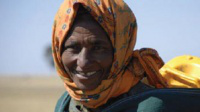CAFOD launches emergency appeal as Ethiopia faces worst drought in 60 years

image CAFOD
The UK government pledged £38 million in food aid to Ethiopia on Sunday, after the United Nations warned that many countries in the Horn of Africa were facing famine following the "worst drought in 60 years".
International Development Secretary Andrew Mitchell said the World Food Programme aid, equivalent to $61 million or 42 million euros, could feed 1.3 million people for three months and would also help treat 329,000 malnourished children and mothers.
CAFOD welcomed the news, but said other countries would also have to help in order to avoid a catastrophe. "We cannot underestimate the gravity of the situation" a CAFOD spokesman said. "The rains have gone, the crops have failed, livestock are dying, and thousands of people are migrating in search of food but with nowhere better to go. There is nothing on the horizon that will improve that picture, and every indication it will get much, much worse.
"So Andrew Mitchell's announcement is welcome and essential, but we need to see the same sense of urgency from other governments."
Eight million people are facing food and water shortages as a drought worsens in the East and Horn of Africa. Poor rains in East Africa have led to failed harvests, serious water and pasture shortages, and the deaths of thousands of animals.
The drought is a result of the La Nina phenomenon: lower than normal temperatures in the Pacific Ocean have had serious effects on weather conditions around the world. In many areas of East Africa, the rains that usually fall from March to June were far less heavy than usual.
"It now takes ten hours to get to the nearest water point," says Halake Elmote, 50, from the Borena Zone of southern Ethiopia, "and you have to climb a mountain to get there. The women left our village at four o'clock yesterday afternoon and returned at two o'clock this morning. The water is not enough even for the families and calves at home."
Because of the water shortages, tens of thousands of animals have died in Borena alone. It's a similar story in other regions: farmers struggle to make a living as their livestock die, and, with food prices on the rise, it's hard for people to cope. In parts of north-eastern Kenya, a quarter of the population is dangerously malnourished.
The East Africa region is still recovering from one of the worst droughts in recent history. More than 20 million people faced life-threatening shortages of food and water in 2009 following successive years of failed rains.
"This is an ongoing crisis, which becomes more severe every couple of years," said Fergus Conmee from CAFOD's humanitarian team. "That's why we can't just deliver food and water. We need to find ways to reduce the impact of future droughts."
We have been working in some of the worst-hit regions in Kenya and Ethiopia, providing drought-resistant seeds to help farmers improve their harvests, and supplying feed so that farmers can keep their animals alive.
We have also been building and improving wells and dams, so that people don't have to travel so far to collect water.
To donate to CAFOD's emergency fund see: https://cafod.secure.force.com/donate/?id=70180000000FgYiAAK


















